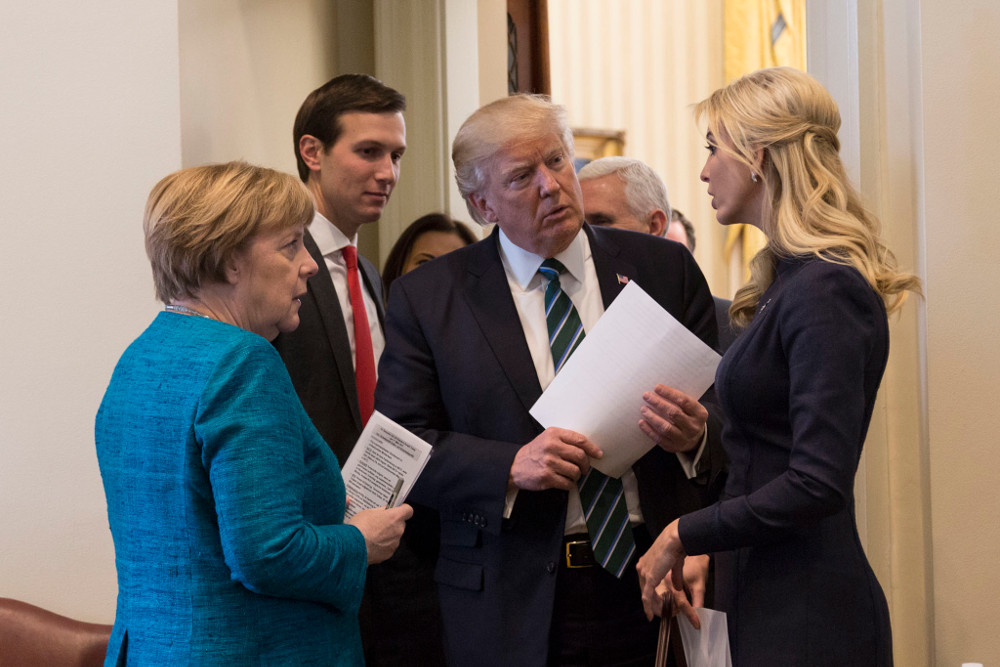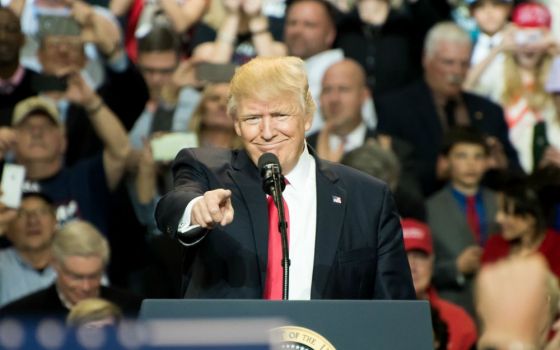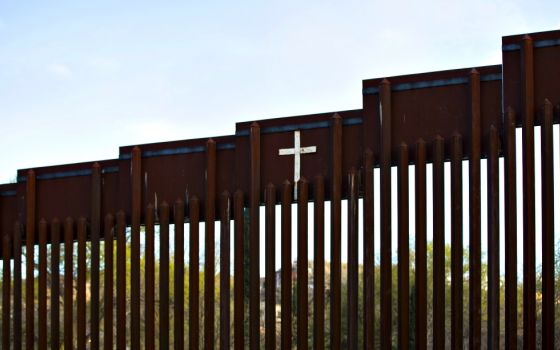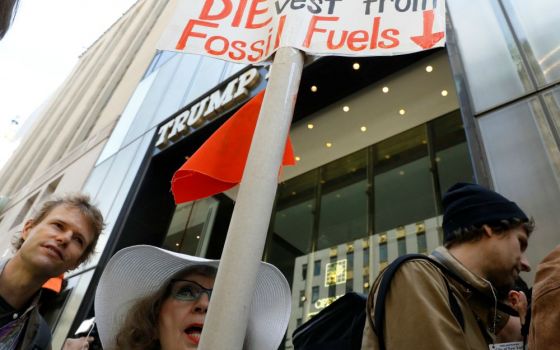
President Donald Trump meets with German Chancellor Angela Merkel, left, March 17, joined by Jared Kushner and Ivanka Trump, at the White House in Washington. (Wikimedia Commons/Official White House Photo/Shealah Craighead)
When Donald Trump was elected president of the United States last November, the European governments treated this unforeseen event with an embarrassing silence. Only politicians from the far right such as Marine Le Pen in France or Brexit partisans in Britain expressed their delight at seeing the victory of a populist leader who had stated many times his despisal for the European Union.
Later on, some European leaders tried to build a relationship with the new head of the most powerful country in the world. Theresa May, the British prime minster, made a well-advertised trip to Washington, as she hoped to get Trump's support for her difficult negotiation with Brussels. The Polish government, which is eager to show that its only reliable ally is America, invited Trump to Warsaw, where he delivered an ambiguous speech.
Last but not least, newly elected French President Emmanuel Macron thought that Trump would enjoy the army display on Bastille Day, July 14, the French national day. The American president came, had a wonderful time in Paris but did not change his decision to pull out of the Paris accords on climate change.
Today, more than nine months into Trump's presidency, nobody in Europe believes anymore that the American president can be a useful partner or the model of a successful populist policy. His approval rate is abysmal in every European country except Poland. No longer do Le Pen or her populist allies in the Netherlands and Austria seek his friendship or refer to him. As for May, she has given up inviting him to London for fear of protest movements that would be hard to check.
Even more important is the attitude of Europe's most powerful country, Germany. Chancellor Angela Merkel has from the start shown her deep disagreement with a man she considers both unreliable and biased in favor of Russia.
It must be noted that during the recent electoral campaign for the German Parliament, the chancellor was criticized on many topics but she was never reproached for her behavior toward Trump. The far right, which won 92 seats in the Bundestag, never tried to show any kind of sympathy for the American president. It is clear that the new coalition Merkel is trying to build with the Liberals and the Greens will follow the same policy on foreign affairs and will not be friendlier toward the White House.
Now, the European Union and the main European governments are trying to build a foreign policy that will take into account the new relationship with the United States. They consider that they have to deal with a weak State Department that has lost many experienced diplomats and whose boss, Rex Tillerson, is not on the best terms with the president. The White House, where the main decisions are made, appears chaotic and difficult to understand.
However, the main lines of Trump policy are clear. He is hostile to any kind of multilateral agreement, considers the European Union as useless or maybe even dangerous, and intends to give priority to American economic interests even if it proves counterproductive in the long term.
In fact, and contrary to what happened in a not-so-distant past, Europe can face many important matters without the support or the advice of the Unites States. Its main worries — Brexit, the handling of migrants, and even its relationship with Vladimir Putin's Russia and with China — don't need a constant dialogue with the White House, which cares little anyway.
The only exception concerns military matters. During his campaign, Trump famously considered NATO as obsolete. Many European leaders wondered if he was ready to sink this organization and seek a partnership with Russia.
Trump's election has probably led to a permanent change in transatlantic relations.
In fact, his military advisers thought differently and managed to save the alliance. Poland, Romania and the Baltic states, the countries closest to Russia, now enjoy the support of European and American forces working in full harmony. The same can be said of French and British contributions to the American efforts in Iraq and Syria.
In this time of upheaval, the Vatican and the national Catholic churches have been discreet. Their main concern is convincing European nations to accept a huge flux of migrants, mostly Muslims coming from Libya and the Middle East.
Pope Francis has made it clear that he did not agree with Trump's vision of building a wall to stop migrants from crossing America's southern border. However, the European bishops' conferences have been more cautious. They are aware that the populations of Europe are highly reluctant to absorb millions of strangers who are alien to their way of life. The European bishops certainly do not approve of the outrageous statements of the American president, but they do not push for a more generous policy in favor of the millions of people who seek, perhaps in vain, a safe refuge on the old continent.
Advertisement
For the church, as for the politicians, the migrant question is an intractable problem and no lesson can be learned from the present American policy.
Trump's election has probably led to a permanent change in transatlantic relations. Europe, facing its own challenges, is learning to go it on its own. If the U.S. is missed in the international community, the loss may be felt in the leadership role it assumed, in spite of its flaws, fighting for human rights and the freedom of information.
That time seems over and probably will never come back. It remains to be seen if a renovated European Union will be able to take over this role on the world stage and successfully fight for the defense of human rights on the international scene.
[Antoine de Tarlé is a regular contributor to the French Jesuit monthly Etudes.]








